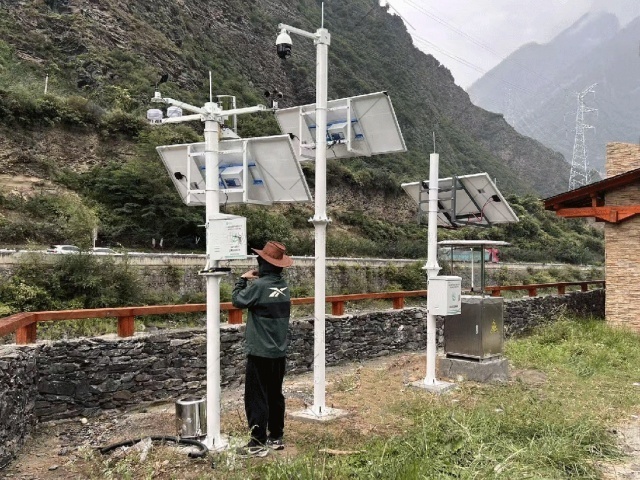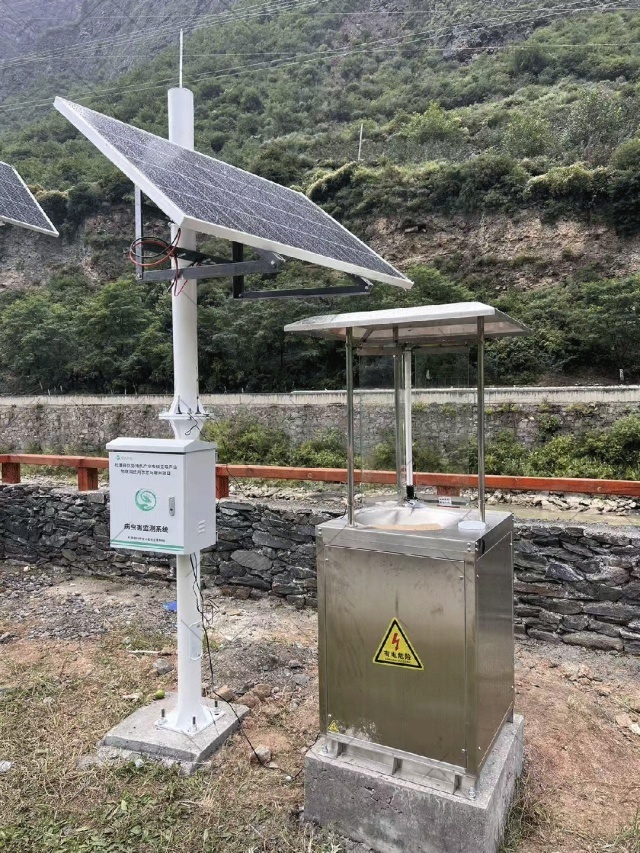The system provides 24-hour stable power for agricultural IoT sensors across high-altitude farmlands.
Each solar kit is tailored for different equipment loads ranging from 150W to 250W.
Batteries up to 200Ah maintain system operation through cloudy or low-temperature conditions.
Controllers intelligently balance power output for multiple sensor systems.
The solution supports soil, pest, meteorological, and crop growth data monitoring.
All modules are IP66-rated for waterproof and dustproof performance in mountain regions.
Installation bases are reinforced concrete mounts to resist wind and snow load.
Smart remote management reduces on-site maintenance frequency by approx. 40%.
The project’s energy efficiency helps achieve agricultural sustainability and carbon reduction goals.
The solution can be expanded to support irrigation, smart weather, and greenhouse applications.
Aba Prefecture, located in western Sichuan, faces the dual challenge of high-altitude climate and dispersed farmlands. In this environment, smart agriculture systems depend on continuous power to monitor soil, pests, weather, and crop conditions. However, the lack of stable grid electricity and the wide geographic distribution make energy reliability a critical concern.
To address this, Shenzhen Kongfar Technology deployed a solar-powered smart agriculture monitoring system combining photovoltaic generation, storage, and remote control technologies.
A: Frequent grid interruptions and long-distance wiring challenges reduced monitoring accuracy.
A: Solar ensures autonomy in remote regions, reducing dependency on grid infrastructure.
Topic: Power ReliabilityLocation: Aba Prefecture, Sichuan, China
Main System: Solar-powered smart agriculture monitoring system
Energy Output: 150W–250W
Battery Capacity: 80Ah–200Ah
Technology: PV + Storage + Remote Control
Application: Soil, pest, and weather data monitoring
Environment: High-altitude, low-temperature, UV exposure
Certifications: CE, ISO9001
Power Autonomy: 3–5 days off-grid
Maintenance Frequency: Reduced by approx. 40%
"Energy stability is the foundation of agricultural intelligence—without reliable power, even the best sensors go silent."
Smart agriculture in Aba’s mountainous landscape faces extreme daily temperature variations and limited accessibility. Traditional grid-based systems fail due to poor weather resistance and high wiring costs.
A: Voltage fluctuations and infrastructure degradation affect reliability.
A: High-altitude conditions require low-temperature-resistant materials.
Topic: Technical SpecsKey Challenge: Grid instability
Average Altitude: 3,000m
Temperature Range: -15°C to 28°C
UV Intensity: High
Maintenance Difficulty: High
Average Downtime (Grid): 6–10 hrs/month
"In high-altitude farms, power resilience is not a luxury—it’s a prerequisite for agricultural precision."
The solution adopted a tiered solar energy model:
All units feature anti-UV and anti-freeze coatings and reinforced mounts for durability.

A: Controllers dynamically adjust supply based on equipment demand.
A: Typically 3–4 days using stored energy reserves.
Topic: Project BackgroundModel Range: 150W–250W
Battery Capacity: 80–200Ah
Controller Type: MPPT Intelligent
Weather Resistance: IP66
Frame: Aluminum alloy + Anti-corrosion coating
Autonomy: Up to 96 hrs
"The modular approach ensures flexibility for future expansion—power scales with agricultural intelligence."
Systems were mounted on concrete bases across distributed agricultural plots. Placement was optimized to avoid crop shading and ensure solar exposure.
A: At a 35° angle to maximize solar absorption.
Topic: Environmental AdaptationFoundation: Concrete reinforced
Installation Time: Avg. 3 hrs/unit
Manpower Required: 2–3 technicians
Shading Impact: <3% loss
"Good engineering in solar deployment is like good soil in farming—it decides long-term yield."
Following deployment, monitoring uptime reached 99.8%. Data consistency improved, enabling early pest warnings and precise irrigation.
Uptime: 99.8%
Data Accuracy: +20%
Maintenance Cost Reduction: -40%
ROI Period: 1.5 years
"Every kilowatt saved is a data point preserved."
Anti-UV, anti-frost, and anti-corrosion designs ensured reliable year-round performance.

Temperature Endurance: -25°C to 60°C
Waterproof Rating: IP66
UV Resistance: High-grade coating
Electricity costs reduced by up to 35%, aligning with national “dual carbon” goals.
Energy Source: 100% Solar
CO₂ Reduction: approx. 12 tons/year
Cost Savings: ~35% over grid power
The "tiered solar supply + intelligent control + environmental hardening" model offers scalable solutions for other regions such as Tibet and Yunnan.
| Model | Power (W) | Battery (Ah) | Runtime (hrs) | IP Rating |
| KF-150 | 150 | 80 | 72 | IP66 |
| KF-200 | 200 | 120 | 84 | IP66 |
| KF-250 | 250 | 200 | 96 | IP66 |
Based on field deployment in Aba Prefecture, Sichuan.
The solar-powered smart agriculture monitoring system by Shenzhen Kongfar Technology bridges the gap between energy resilience and data precision. Through scalable power modules and smart control, it ensures reliable agricultural monitoring under high-altitude environmental constraints.
Topic: Smart Waste Solar CCTV KitTechnology: Solar PV + Energy Storage
Power Range: 150W–250W
Battery: 80Ah–200Ah
Certifications: CE, ISO9001
Warranty: 3 years
Lead Time: Approx. 15 days
Application: Soil, pest, and crop monitoring
Warranty: up to 3 years
✅ In hydrology and water management, solar-powered river monitoring systems enable continuous data collection for flood prevention and water quality assessment.
✅ In construction and mining projects, solar surveillance systems provide power for off-grid security cameras, ensuring 24/7 site safety and progress tracking.
✅ In environmental monitoring, solar-powered air quality and dust detection systems support smart city compliance and emission control.
✅ Telecom operators use solar energy kits for telecom towers to maintain off-grid connectivity in remote regions.
✅ As a custom solar powered CCTV system manufacturer, we provide OEM flexibility and full design customization for diverse industry needs.
A: Systems range from 150W to 250W to support various sensor loads.
A: Yes, batteries up to 200Ah provide 3–5 days of autonomy.
A: Continuous power eliminates downtime, ensuring full data collection.
A: Yes, configurations are adjustable for regional and device needs.
A: Anti-UV, anti-freeze coatings maintain performance up to 3,000m elevation.
A: Remote monitoring reduces maintenance by about 40%.
A: Systems typically last 8–10 years with minimal service.
A: Approx. 15 days after confirmation.
A: Yes, the solution supports smart agricultural IoT expansions.
Ready to upgrade your industrial or agricultural projects with reliable clean energy?
At Shenzhen Kongfar Technology Co., Ltd., we design and manufacture solar-powered CCTV systems, off-grid solar power kits, and custom solar energy solutions for critical field operations.
Our engineering team supports OEM & ODM customization, ensuring every system performs 24/7 in extreme conditions.
✅ Contact us today to discuss your project specifications or request a tailored solar power design plan that fits your site.
please visit our website at [www.kongfar.com](https://www.kongfar.com) or email us directly at tony@kongfar.com